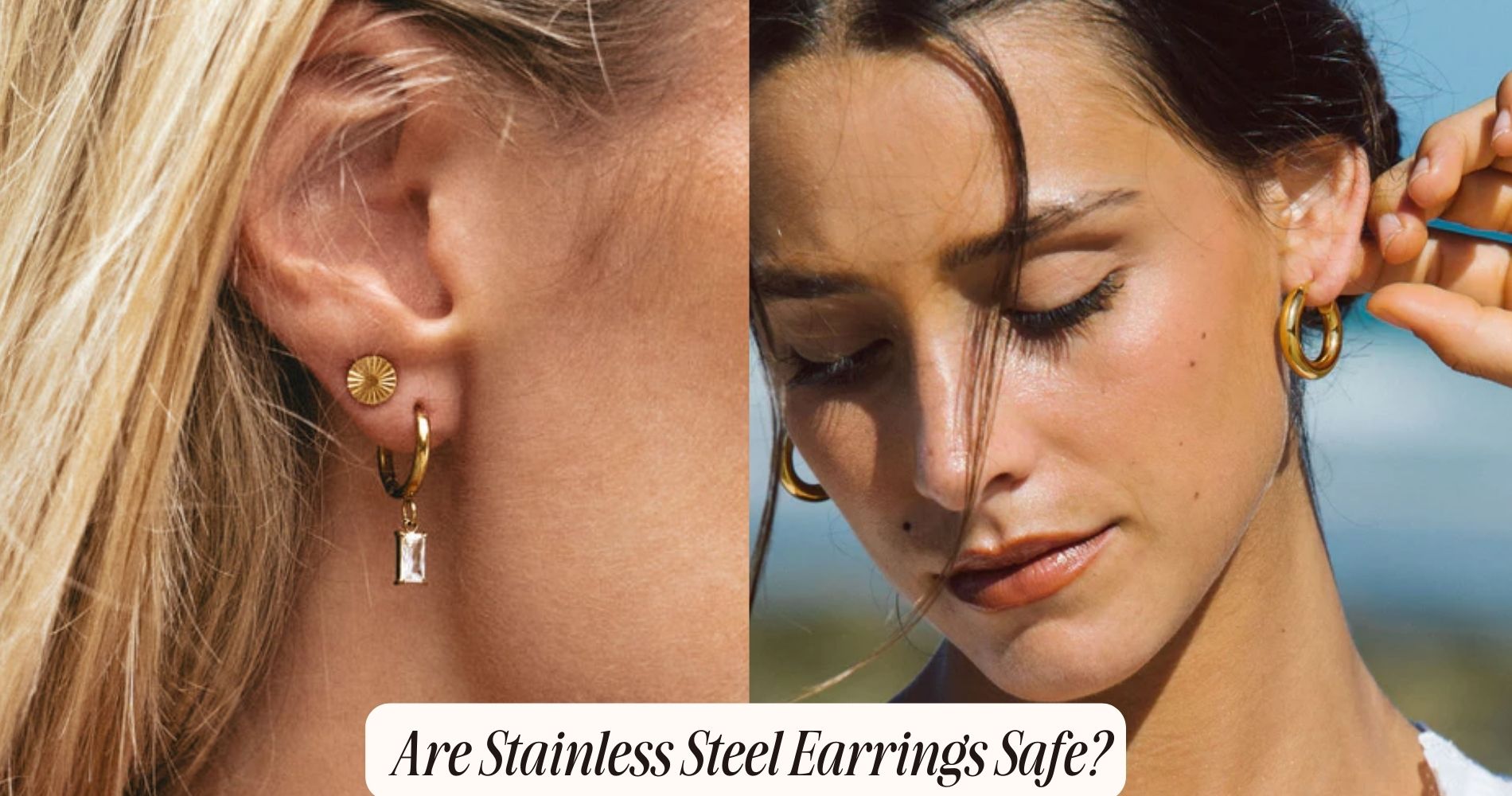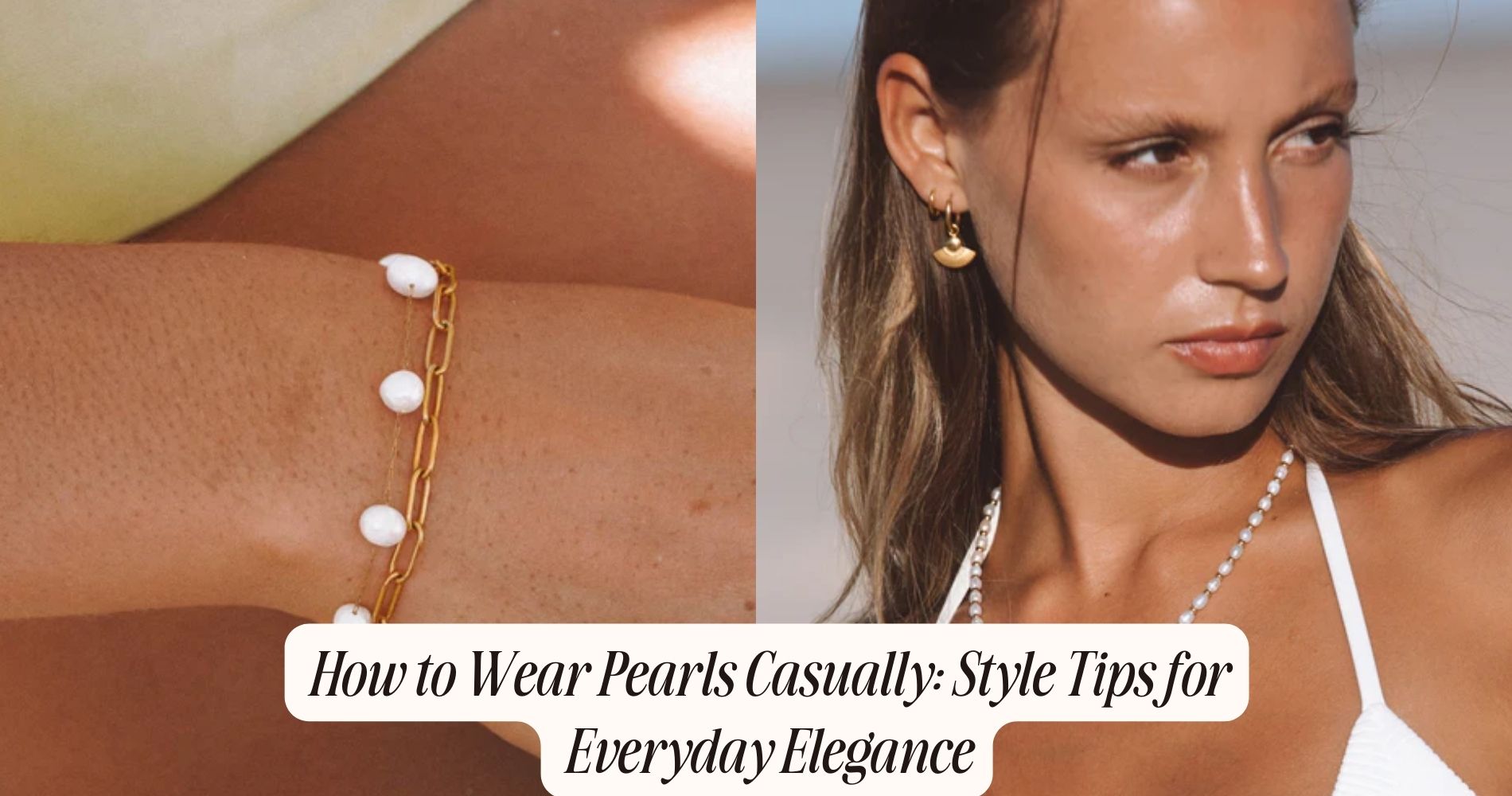
Are Stainless Steel Earrings Safe?
Are stainless steel earrings safe? Yes, stainless steel earrings are generally safe for most wearers, especially when made from high-quality surgical-grade stainless steel like 316L. This material contains lower nickel levels, greatly reducing the likelihood of allergic reactions. However, individual sensitivities can vary, so it's important to monitor for any skin irritation. To guarantee safety, always opt for products with appropriate quality certifications to confirm the alloy's purity. Additionally, even though stainless steel resists tarnishing and is durable, regular care is necessary to maintain their quality. If you're curious about choosing the right earrings, you'll uncover more insights on suitable options in our Waterproof Earrings collection.
What Is Stainless Steel?
Stainless steel is an alloy primarily made of iron, chromium, and nickel, which gives it exceptional resistance to corrosion and tarnishing. The stainless steel composition typically includes about 10.5% chromium, which forms a passive layer of chromium oxide on the surface, protecting the underlying metal from rust. Nickel enhances this resistance and adds to the alloy's durability, making it suitable for various applications.
You'll find stainless steel used in a multitude of industries and products. In the culinary world, it's a go-to material for cookware, cutlery, and kitchen appliances due to its non-reactive properties. In construction, stainless steel is valued for its strength and aesthetic appeal, often utilized in architectural elements and structural components. Additionally, it's widely used in medical instruments and implants, where hygiene and resistance to bodily fluids are crucial.
Understanding stainless steel's composition and uses will help you appreciate its versatility and why it's often preferred in environments where durability and corrosion resistance are significant. Whether in your kitchen or on your body, stainless steel plays an essential role in daily life.
Benefits of Stainless Steel Earrings
Choosing stainless steel earrings offers numerous advantages, especially due to their durability and resistance to tarnishing, making them an ideal option for everyday wear.
Unlike other materials, stainless steel maintains its appearance over time, ensuring you won't have to frequently replace your jewelry. This durability comparison with other metals highlights how stainless steel stands up against wear and tear, making it a cost-effective choice in the long run.
In terms of fashion trends, stainless steel earrings can effortlessly fit into various styles, from minimalist to bold statements. Their modern, sleek look complements different outfits, ensuring versatility in your jewelry collection.
You can mix and match them with other accessories without worrying about discoloration or damage. Additionally, stainless steel's ability to hold its shape means you can enjoy intricate designs without the risk of bending or breaking.
Lastly, these earrings are generally lightweight, making them comfortable for all-day wear. That means you can enjoy your stylish earrings while going about your daily activities.
Hypoallergenic Properties Explained
Many people with sensitive skin appreciate that stainless steel earrings often feature hypoallergenic properties, reducing the risk of allergic reactions and irritation. When you choose stainless steel, you're opting for a material that typically contains a lower percentage of nickel, which is a common allergen. This makes stainless steel an excellent choice for those with heightened skin sensitivity.
Hypoallergenic materials, like stainless steel, are designed to minimize the likelihood of adverse reactions. They're less likely to provoke inflammation or discomfort, allowing you to wear earrings without worry. It's essential to recognize, however, that while stainless steel is generally safe, individual reactions can still occur.
For those who frequently experience irritation from other metals, stainless steel provides a reliable alternative. Its durability and resistance to tarnishing further enhance its appeal, making it a practical option for everyday wear.
Potential Allergic Reactions
When wearing stainless steel earrings, it's important to be aware of potential allergens that could cause reactions.
Common materials in jewelry, such as nickel or certain coatings, might trigger symptoms like itching or swelling.
Understanding these risks can help you make informed choices about your accessories.
Common Allergens in Jewelry
Common allergens in jewelry, such as nickel and cobalt, can trigger allergic reactions in sensitive individuals, leading to discomfort and irritation.
If you have nickel sensitivity, it's vital to be aware of the materials used in your jewelry. Nickel is a common alloy in various metals, often added to enhance durability and shine. Unfortunately, even small amounts of nickel can cause reactions in those with sensitivity.
Cobalt, another common allergen, is often found in jewelry materials, particularly in products marketed as hypoallergenic. Although some people may tolerate cobalt better than nickel, it can still provoke reactions in sensitive individuals.
When shopping for jewelry, you should prioritize materials known for their hypoallergenic properties, like titanium, surgical stainless steel, or gold with a high purity level. Understanding the composition of the jewelry you wear can help you avoid allergens that might lead to an adverse reaction.
Always check labels and inquire about the materials used. By being proactive and informed, you can enjoy wearing jewelry without the worry of allergic reactions that could disrupt your day.
Symptoms of Allergic Reactions
Recognizing the symptoms of allergic reactions to jewelry is vital for anyone sensitive to materials like nickel and cobalt, as these reactions can manifest in various forms, impacting your comfort and well-being. If you notice itchy skin after wearing earrings, it may signal an allergic response. This discomfort often arises within hours or days of exposure to allergens.
Redness is another common symptom, often appearing around the area where the jewelry contacts your skin. This localized irritation can be accompanied by swelling, indicating that your body is reacting defensively to the metal. If the reaction escalates, you might experience blistering or peeling skin, which can be distressing and inconvenient.
It's important to monitor your body's response when trying new jewelry, especially if you have a history of allergies. If you experience these symptoms, it's wise to remove the earrings immediately and consult a healthcare professional for advice on managing the reaction.
Understanding these signs can help you avoid further discomfort and guarantee that your jewelry choices are safe and suitable for your skin. Choosing hypoallergenic options can greatly reduce the risk of these unpleasant reactions.
Choosing Quality Stainless Steel
When choosing stainless steel earrings, it's essential to understand the different types of stainless steel available, as they vary in quality and safety.
Look for quality certifications that indicate the material meets specific standards, ensuring you're making a safe choice for your ears.
Additionally, being aware of potential allergic reactions can help you select earrings that won't irritate your skin.
Types of Stainless Steel
Choosing quality stainless steel for earrings involves understanding the different grades available, each offering unique properties that affect durability and skin sensitivity.
The most commonly used stainless steel grades for jewelry are 304 and 316L. Grade 304 is often recognized for its corrosion resistance, but it can cause reactions in sensitive individuals. On the other hand, 316L is commonly referred to as surgical stainless steel, making it a safer choice for those with sensitive skin due to its lower nickel content.
When selecting stainless steel earrings, pay attention to the stainless steel finishes as well. Polished finishes provide a shiny surface that enhances appearance but may require more maintenance to avoid scratches. Matte finishes, on the other hand, can hide minor blemishes but may not have the same level of shine.
Ultimately, choosing the right stainless steel grade and finish is essential for ensuring both comfort and durability. Always look for reputable brands that specify the grade of stainless steel used in their earrings; this transparency can help you make an informed decision, enhancing your overall experience with stainless steel jewelry.
Quality Certifications to Consider
Understanding quality certifications can greatly influence your decision when selecting stainless steel earrings, guaranteeing you're choosing products that meet safety and durability standards. Various certification bodies evaluate materials based on established quality standards, which can help you identify reliable options. For instance, look for earrings that meet ASTM (American Society for Testing and Materials) standards, as these indicate rigorous testing for corrosion resistance and overall quality.
Additionally, the ISO (International Organization for Standardization) certifications can be an indicator of manufacturing excellence, assuring you that the product has undergone stringent assessments. Earrings marked with these certifications typically offer better durability and lower risk of failure, enhancing your overall experience.
When shopping, always check for these certifications on product labels or manufacturer websites. A reputable seller will provide clear information regarding quality standards, helping you make informed choices.
Allergic Reactions and Safety
Allergic reactions can be a significant concern when it comes to wearing stainless steel earrings, so it's crucial to select high-quality materials that minimize the risk of irritation. Stainless steel can differ widely in composition, and not all earring materials are created equal.
Look for earrings made from surgical-grade stainless steel, often labeled as 316L or 304, as these grades contain lower levels of nickel, a common allergen for those with skin sensitivities.
When choosing stainless steel earrings, be mindful of the metal's quality. Cheaper alternatives may contain impurities or higher nickel content that can provoke allergic reactions. Always check for certifications or descriptions that confirm the alloy's purity.
If you have known sensitivities, consider opting for hypoallergenic options, which are designed specifically to reduce the likelihood of irritation.
Additionally, it's wise to pay attention to how your skin reacts to new earrings. If you experience redness, itching, or swelling, it might indicate that the earring materials aren't compatible with your skin.
Ultimately, investing in quality stainless steel earrings won't only enhance your style but also safeguard your comfort and health.
Care and Maintenance Tips
To keep your stainless steel earrings looking their best, regularly clean them with a mild soap solution and a soft cloth to remove dirt and oils. This simple cleaning method prevents buildup that can dull their shine. Avoid harsh chemicals or abrasive materials, as they can scratch the surface and compromise the finish.
After cleaning, make certain to dry your earrings thoroughly to prevent moisture buildup, which can lead to tarnishing over time. For long-term care, consider using proper storage solutions. Store your earrings in a soft pouch or a jewelry box with compartments to prevent them from scratching each other. Avoid leaving them exposed to direct sunlight or humidity, as these conditions can affect their appearance.
If your earrings feature embellishments like stones or beads, be extra cautious during cleaning. Use a gentle touch and avoid submerging them in water.
Alternatives to Stainless Steel
When considering alternatives to stainless steel earrings, you might explore options like titanium, sterling silver, or even hypoallergenic plastics, each offering unique benefits and styles.
Titanium earrings are an excellent choice if you're looking for durability and lightweight wear. They're corrosion-resistant and less likely to cause allergic reactions, making them ideal for sensitive skin.
Sterling silver is another popular alternative. It combines elegance with a classic look, perfect for both everyday wear and special occasions. However, keep in mind that sterling silver requires more maintenance to prevent tarnishing compared to stainless steel.
If you're interested in gold earrings, they can be a luxurious option as well. Gold is hypoallergenic, especially when it's alloyed with other metals like palladium or platinum. While they tend to be pricier, gold earrings offer a timeless aesthetic that can elevate any outfit.
Lastly, hypoallergenic plastics have emerged as a trendy choice, particularly for those with metal sensitivities. These materials can mimic the look of metal while providing comfort and safety.
Final Thoughts on Safety
Prioritizing safety in your choice of earrings guarantees not only comfort but also peace of mind, especially if you have sensitive skin or specific metal allergies.
Stainless steel earrings are often a favored option due to their durability and resistance to tarnishing. However, it's important to take into account the quality and composition of the stainless steel used. Not all stainless steel is created equal, and some may contain nickel, which can trigger allergic reactions in sensitive individuals.
When selecting stainless steel earrings, look for pieces that comply with safety regulations, ensuring they meet industry standards for hypoallergenic materials.
User experiences can provide valuable insights—many wearers report positive outcomes, noting minimal irritation and long-lasting wear. However, it's vital to pay attention to your body's reactions. If you notice any discomfort or irritation, think about consulting a professional or switching to another material.
Frequently Asked Questions
Can Stainless Steel Earrings Cause Metal Fatigue Over Time?
Stainless steel earrings typically don't cause metal fatigue from long-term exposure. However, factors like body chemistry and environmental conditions can affect their durability, so it's wise to monitor for any signs of wear over time.
Are There Specific Grades of Stainless Steel for Earrings?
Yes, there are specific stainless steel grades for earrings, such as 316L and 304. These grades offer hypoallergenic properties, making them suitable for sensitive skin while ensuring durability and resistance to corrosion over time.
Can I Wear Stainless Steel Earrings During Swimming or Showering?
You can wear stainless steel earrings while swimming or showering, but remember to clean them afterward for proper earring maintenance. Prolonged water exposure might affect their shine, so regular care is essential.
Do Stainless Steel Earrings Rust or Tarnish Under Certain Conditions?
Stainless steel earrings typically resist corrosion, but under extreme conditions, they might tarnish. To maintain their luster, avoid exposure to harsh chemicals and clean them regularly for peak durability and appearance.
How Can I Identify Genuine Stainless Steel Earrings?
To identify genuine stainless steel earrings, check for markings like "316L" or "Surgical Steel." Avoid fakes by examining the finish; it should be smooth and shiny, without discoloration or rough edges. Trust reputable sellers.
Conclusion
To summarize, stainless steel earrings are generally safe and offer numerous benefits, including hypoallergenic properties for most wearers.
While allergic reactions can occur, choosing high-quality stainless steel minimizes this risk.
With proper care, these earrings can last a long time without causing irritation.
If you're sensitive to certain metals, consider alternatives, but stainless steel remains a reliable choice for stylish and safe jewelry.
Always prioritize quality to guarantee a comfortable wearing experience.
























Leave a comment
This site is protected by hCaptcha and the hCaptcha Privacy Policy and Terms of Service apply.